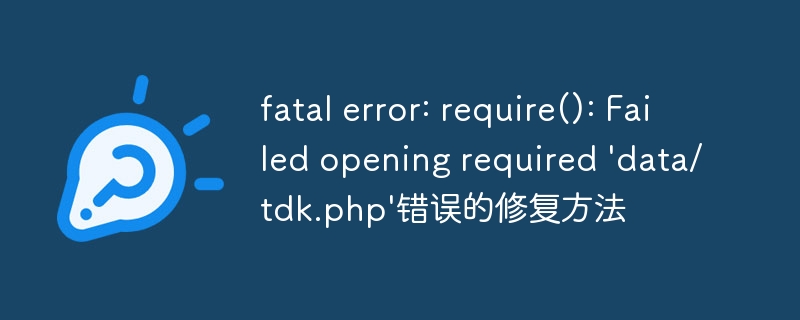Home >Backend Development >PHP Tutorial >fatal error: require(): Failed opening required 'data/tdk.php' error fix
fatal error: require(): Failed opening required 'data/tdk.php' error fix
- WBOYWBOYWBOYWBOYWBOYWBOYWBOYWBOYWBOYWBOYWBOYWBOYWBOriginal
- 2023-11-27 11:40:59938browse

fatal error: require(): Failed opening required 'data/tdk.php' error repair method
In the process of website development or maintenance, we often You will encounter various errors. One of the common errors is "Fatal error: require(): Failed opening required 'data/tdk.php'". This error is usually caused by a problem with the file path or the file itself. In this article, we'll cover some common fixes to help you resolve this issue.
First of all, we need to understand the cause of this error. In PHP, the require() function is used to include a specified file. If the file does not exist or the path is incorrect, an error will be reported. Therefore, when we see the "Fatal error: require(): Failed opening required 'data/tdk.php'" error, it means that PHP cannot find the tdk.php file in the specified path.
Next, we can follow the steps below to fix this problem:
- Check whether the path is correct: First, we need to confirm whether the path is correct. Make sure the data/tdk.php file exists in the specified path. If the file does not exist or the path is incorrect, we need to update the file path in the require() function.
- Check file permissions: Sometimes, file permission issues can also cause this error. Please make sure the data/tdk.php file has read permissions. You can change file permissions by running the
chmod 644 data/tdk.phpcommand. - Check the case of file names: In some operating systems, file names are case-sensitive. Please make sure the case of the file name is consistent with that in the require() function. For example, if the file name is tdk.php and the require() function is written as TDK.PHP, it will cause an error that the file cannot be found.
- Check file encoding: Sometimes, the encoding format of the file can also cause this error. Please ensure that the encoding format of the data/tdk.php file is UTF-8 and not other formats. You can change the file's encoding to UTF-8 via a text editor.
The above are some common methods to fix "Fatal error: require(): Failed opening required 'data/tdk.php'" error. If you still haven't solved the problem after trying the steps above, you can try the following additional methods:
- Check if the file exists elsewhere: Sometimes, we may mistakenly place the file in another location The location cannot be found. Please make sure the data/tdk.php file exists in the correct location. You can use a file manager or command line tool to find the file.
- Check how files are referenced: Sometimes, we may mistakenly reference the same file multiple times in the code, resulting in an incorrect file path. Please check if you have the same require() function in your code, and if so, make sure the path is correct.
Summary:
"Fatal error: require(): Failed opening required 'data/tdk.php'" error is a relatively common PHP error, usually due to the file path Or it may be caused by a problem with the file itself. When fixing this error, we need to first check whether the path is correct, ensure that the file has the correct permissions, and pay attention to the case and encoding format of the file name. If the problem persists, you can further check to see if the file exists elsewhere or if there are duplicate references in the code.
Through the above methods, I hope it can help you solve this error and allow your website to run normally.
The above is the detailed content of fatal error: require(): Failed opening required 'data/tdk.php' error fix. For more information, please follow other related articles on the PHP Chinese website!

